
LLMLingua
[EMNLP'23, ACL'24] To speed up LLMs' inference and enhance LLM's perceive of key information, compress the prompt and KV-Cache, which achieves up to 20x compression with minimal performance loss.
Stars: 4827
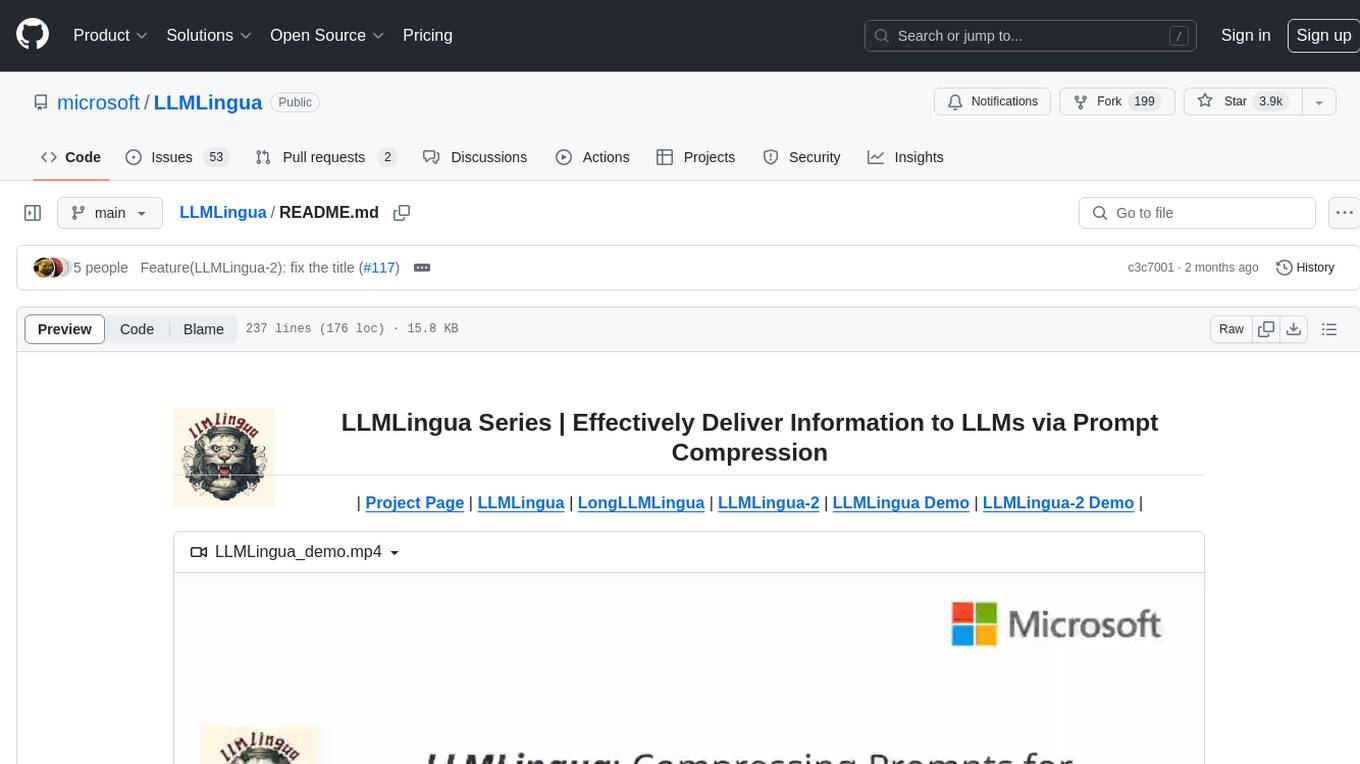
LLMLingua is a tool that utilizes a compact, well-trained language model to identify and remove non-essential tokens in prompts. This approach enables efficient inference with large language models, achieving up to 20x compression with minimal performance loss. The tool includes LLMLingua, LongLLMLingua, and LLMLingua-2, each offering different levels of prompt compression and performance improvements for tasks involving large language models.
README:
| Project Page | LLMLingua | LongLLMLingua | LLMLingua-2 | LLMLingua Demo | LLMLingua-2 Demo |
https://github.com/microsoft/LLMLingua/assets/30883354/eb0ea70d-6d4c-4aa7-8977-61f94bb87438
- 🍩 [24/12/13] We are excited to announce the release of our KV cache-centric analysis work, SCBench, which evaluates long-context methods from a KV cache perspective.
- 👘 [24/09/16] We are pleased to announce the release of our KV cache offloading work, RetrievalAttention, which accelerates long-context LLM inference via vector retrieval.
- 🌀 [24/07/03] We're excited to announce the release of MInference to speed up Long-context LLMs' inference, reduces inference latency by up to 10X for pre-filling on an A100 while maintaining accuracy in 1M tokens prompt! For more information, check out our paper, visit the project page.
- 🧩 LLMLingua has been integrated into Prompt flow, a streamlined tool framework for LLM-based AI applications.
- 🦚 We're excited to announce the release of LLMLingua-2, boasting a 3x-6x speed improvement over LLMLingua! For more information, check out our paper, visit the project page, and explore our demo.
- 👾 LLMLingua has been integrated into LangChain and LlamaIndex, two widely-used RAG frameworks.
- 🤳 Talk slides are available in AI Time Jan, 24.
- 🖥 EMNLP'23 slides are available in Session 5 and BoF-6.
- 📚 Check out our new blog post discussing RAG benefits and cost savings through prompt compression. See the script example here.
- 🎈 Visit our project page for real-world case studies in RAG, Online Meetings, CoT, and Code.
- 👨🦯 Explore our './examples' directory for practical applications, including LLMLingua-2, RAG, Online Meeting, CoT, Code, and RAG using LlamaIndex.
LLMLingua utilizes a compact, well-trained language model (e.g., GPT2-small, LLaMA-7B) to identify and remove non-essential tokens in prompts. This approach enables efficient inference with large language models (LLMs), achieving up to 20x compression with minimal performance loss.
-
LLMLingua: Compressing Prompts for Accelerated Inference of Large Language Models (EMNLP 2023)
Huiqiang Jiang, Qianhui Wu, Chin-Yew Lin, Yuqing Yang and Lili Qiu
LongLLMLingua mitigates the 'lost in the middle' issue in LLMs, enhancing long-context information processing. It reduces costs and boosts efficiency with prompt compression, improving RAG performance by up to 21.4% using only 1/4 of the tokens.
-
LongLLMLingua: Accelerating and Enhancing LLMs in Long Context Scenarios via Prompt Compression (ACL 2024 and ICLR ME-FoMo 2024)
Huiqiang Jiang, Qianhui Wu, Xufang Luo, Dongsheng Li, Chin-Yew Lin, Yuqing Yang and Lili Qiu
LLMLingua-2, a small-size yet powerful prompt compression method trained via data distillation from GPT-4 for token classification with a BERT-level encoder, excels in task-agnostic compression. It surpasses LLMLingua in handling out-of-domain data, offering 3x-6x faster performance.
-
LLMLingua-2: Data Distillation for Efficient and Faithful Task-Agnostic Prompt Compression (ACL 2024 Findings)
Zhuoshi Pan, Qianhui Wu, Huiqiang Jiang, Menglin Xia, Xufang Luo, Jue Zhang, Qingwei Lin, Victor Ruhle, Yuqing Yang, Chin-Yew Lin, H. Vicky Zhao, Lili Qiu, Dongmei Zhang
- Ever encountered the token limit when asking ChatGPT to summarize lengthy texts?
- Frustrated with ChatGPT forgetting previous instructions after extensive fine-tuning?
- Experienced high costs using GPT3.5/4 API for experiments despite excellent results?
While Large Language Models like ChatGPT and GPT-4 excel in generalization and reasoning, they often face challenges like prompt length limits and prompt-based pricing schemes.
Now you can use LLMLingua, LongLLMLingua, and LLMLingua-2!
These tools offer an efficient solution to compress prompts by up to 20x, enhancing the utility of LLMs.
- 💰 Cost Savings: Reduces both prompt and generation lengths with minimal overhead.
- 📝 Extended Context Support: Enhances support for longer contexts, mitigates the "lost in the middle" issue, and boosts overall performance.
- ⚖️ Robustness: No additional training needed for LLMs.
- 🕵️ Knowledge Retention: Maintains original prompt information like ICL and reasoning.
- 📜 KV-Cache Compression: Accelerates inference process.
- 🪃 Comprehensive Recovery: GPT-4 can recover all key information from compressed prompts.
PS: This demo is based on the alt-gpt project. Special thanks to @Livshitz for their valuable contribution.
If you find this repo helpful, please cite the following papers:
@inproceedings{jiang-etal-2023-llmlingua,
title = "{LLML}ingua: Compressing Prompts for Accelerated Inference of Large Language Models",
author = "Huiqiang Jiang and Qianhui Wu and Chin-Yew Lin and Yuqing Yang and Lili Qiu",
editor = "Bouamor, Houda and
Pino, Juan and
Bali, Kalika",
booktitle = "Proceedings of the 2023 Conference on Empirical Methods in Natural Language Processing",
month = dec,
year = "2023",
address = "Singapore",
publisher = "Association for Computational Linguistics",
url = "https://aclanthology.org/2023.emnlp-main.825",
doi = "10.18653/v1/2023.emnlp-main.825",
pages = "13358--13376",
}@inproceedings{jiang-etal-2024-longllmlingua,
title = "{L}ong{LLML}ingua: Accelerating and Enhancing {LLM}s in Long Context Scenarios via Prompt Compression",
author = "Huiqiang Jiang and Qianhui Wu and and Xufang Luo and Dongsheng Li and Chin-Yew Lin and Yuqing Yang and Lili Qiu",
editor = "Ku, Lun-Wei and
Martins, Andre and
Srikumar, Vivek",
booktitle = "Proceedings of the 62nd Annual Meeting of the Association for Computational Linguistics (Volume 1: Long Papers)",
month = aug,
year = "2024",
address = "Bangkok, Thailand",
publisher = "Association for Computational Linguistics",
url = "https://aclanthology.org/2024.acl-long.91",
pages = "1658--1677",
}@inproceedings{pan-etal-2024-llmlingua,
title = "{LLML}ingua-2: Data Distillation for Efficient and Faithful Task-Agnostic Prompt Compression",
author = "Zhuoshi Pan and Qianhui Wu and Huiqiang Jiang and Menglin Xia and Xufang Luo and Jue Zhang and Qingwei Lin and Victor Ruhle and Yuqing Yang and Chin-Yew Lin and H. Vicky Zhao and Lili Qiu and Dongmei Zhang",
editor = "Ku, Lun-Wei and
Martins, Andre and
Srikumar, Vivek",
booktitle = "Findings of the Association for Computational Linguistics ACL 2024",
month = aug,
year = "2024",
address = "Bangkok, Thailand and virtual meeting",
publisher = "Association for Computational Linguistics",
url = "https://aclanthology.org/2024.findings-acl.57",
pages = "963--981",
}To get started with LLMLingua, simply install it using pip:
pip install llmlinguaWith LLMLingua, you can easily compress your prompts. Here’s how you can do it:
from llmlingua import PromptCompressor
llm_lingua = PromptCompressor()
compressed_prompt = llm_lingua.compress_prompt(prompt, instruction="", question="", target_token=200)
# > {'compressed_prompt': 'Question: Sam bought a dozen boxes, each with 30 highlighter pens inside, for $10 each box. He reanged five of boxes into packages of sixlters each and sold them $3 per. He sold the rest theters separately at the of three pens $2. How much did make in total, dollars?\nLets think step step\nSam bought 1 boxes x00 oflters.\nHe bought 12 * 300ters in total\nSam then took 5 boxes 6ters0ters.\nHe sold these boxes for 5 *5\nAfterelling these boxes there were 3030 highlighters remaining.\nThese form 330 / 3 = 110 groups of three pens.\nHe sold each of these groups for $2 each, so made 110 * 2 = $220 from them.\nIn total, then, he earned $220 + $15 = $235.\nSince his original cost was $120, he earned $235 - $120 = $115 in profit.\nThe answer is 115',
# 'origin_tokens': 2365,
# 'compressed_tokens': 211,
# 'ratio': '11.2x',
# 'saving': ', Saving $0.1 in GPT-4.'}
## Or use the phi-2 model,
llm_lingua = PromptCompressor("microsoft/phi-2")
## Or use the quantation model, like TheBloke/Llama-2-7b-Chat-GPTQ, only need <8GB GPU memory.
## Before that, you need to pip install optimum auto-gptq
llm_lingua = PromptCompressor("TheBloke/Llama-2-7b-Chat-GPTQ", model_config={"revision": "main"})To try LongLLMLingua in your scenarios, you can use
from llmlingua import PromptCompressor
llm_lingua = PromptCompressor()
compressed_prompt = llm_lingua.compress_prompt(
prompt_list,
question=question,
rate=0.55,
# Set the special parameter for LongLLMLingua
condition_in_question="after_condition",
reorder_context="sort",
dynamic_context_compression_ratio=0.3, # or 0.4
condition_compare=True,
context_budget="+100",
rank_method="longllmlingua",
)To try LLMLingua-2 in your scenarios, you can use
from llmlingua import PromptCompressor
llm_lingua = PromptCompressor(
model_name="microsoft/llmlingua-2-xlm-roberta-large-meetingbank",
use_llmlingua2=True, # Whether to use llmlingua-2
)
compressed_prompt = llm_lingua.compress_prompt(prompt, rate=0.33, force_tokens = ['\n', '?'])
## Or use LLMLingua-2-small model
llm_lingua = PromptCompressor(
model_name="microsoft/llmlingua-2-bert-base-multilingual-cased-meetingbank",
use_llmlingua2=True, # Whether to use llmlingua-2
)Split text into sections, decide on whether to compress and its rate. Use <llmlingua></llmlingua> tags for context segmentation, with optional rate and compress parameters.
structured_prompt = """<llmlingua, compress=False>Speaker 4:</llmlingua><llmlingua, rate=0.4> Thank you. And can we do the functions for content? Items I believe are 11, three, 14, 16 and 28, I believe.</llmlingua><llmlingua, compress=False>
Speaker 0:</llmlingua><llmlingua, rate=0.4> Item 11 is a communication from Council on Price recommendation to increase appropriation in the general fund group in the City Manager Department by $200 to provide a contribution to the Friends of the Long Beach Public Library. Item 12 is communication from Councilman Super Now. Recommendation to increase appropriation in the special advertising and promotion fund group and the city manager's department by $10,000 to provide support for the end of summer celebration. Item 13 is a communication from Councilman Austin. Recommendation to increase appropriation in the general fund group in the city manager department by $500 to provide a donation to the Jazz Angels . Item 14 is a communication from Councilman Austin. Recommendation to increase appropriation in the general fund group in the City Manager department by $300 to provide a donation to the Little Lion Foundation. Item 16 is a communication from Councilman Allen recommendation to increase appropriation in the general fund group in the city manager department by $1,020 to provide contribution to Casa Korero, Sew Feria Business Association, Friends of Long Beach Public Library and Dave Van Patten. Item 28 is a communication. Communication from Vice Mayor Richardson and Council Member Muranga. Recommendation to increase appropriation in the general fund group in the City Manager Department by $1,000 to provide a donation to Ron Palmer Summit. Basketball and Academic Camp.</llmlingua><llmlingua, compress=False>
Speaker 4:</llmlingua><llmlingua, rate=0.6> We have a promotion and a second time as councilman served Councilman Ringa and customers and they have any comments.</llmlingua>"""
compressed_prompt = llm_lingua.structured_compress_prompt(structured_prompt, instruction="", question="", rate=0.5)
print(compressed_prompt['compressed_prompt'])
# > Speaker 4:. And can we do the functions for content? Items I believe are11,,116 28,.
# Speaker 0: a from Council on Price to increase the fund group the Manager0 provide a the the1 is Councilman Super Now. the special group the provide the summerman a the Jazzels a communication from Councilman Austin. Recommendation to increase appropriation in the general fund group in the City Manager department by $300 to provide a donation to the Little Lion Foundation. Item 16 is a communication from Councilman Allen recommendation to increase appropriation in the general fund group in the city manager department by $1,020 to provide contribution to Casa Korero, Sew Feria Business Association, Friends of Long Beach Public Library and Dave Van Patten. Item 28 is a communication. Communication from Vice Mayor Richardson and Council Member Muranga. Recommendation to increase appropriation in the general fund group in the City Manager Department by $1,000 to provide a donation to Ron Palmer Summit. Basketball and Academic Camp.
# Speaker 4: We have a promotion and a second time as councilman served Councilman Ringa and customers and they have any comments.To understand how to apply LLMLingua and LongLLMLingua in real-world scenarios like RAG, Online Meetings, CoT, and Code, please refer to our examples. For detailed guidance, the documentation provides extensive recommendations on effectively utilizing LLMLingua.
To train the compressor on your custom data, please refer to our data_collection and model_training.
For more insights and answers, visit our FAQ section.
This project welcomes contributions and suggestions. Most contributions require you to agree to a Contributor License Agreement (CLA) declaring that you have the right to, and actually do, grant us the rights to use your contribution. For details, visit https://cla.opensource.microsoft.com.
When you submit a pull request, a CLA bot will automatically determine whether you need to provide a CLA and decorate the PR appropriately (e.g., status check, comment). Simply follow the instructions provided by the bot. You will only need to do this once across all repos using our CLA.
This project has adopted the Microsoft Open Source Code of Conduct. For more information see the Code of Conduct FAQ or contact [email protected] with any additional questions or comments.
This project may contain trademarks or logos for projects, products, or services. Authorized use of Microsoft trademarks or logos is subject to and must follow Microsoft's Trademark & Brand Guidelines. Use of Microsoft trademarks or logos in modified versions of this project must not cause confusion or imply Microsoft sponsorship. Any use of third-party trademarks or logos are subject to those third-party's policies.
For Tasks:
Click tags to check more tools for each tasksFor Jobs:
Alternative AI tools for LLMLingua
Similar Open Source Tools

LLMLingua
LLMLingua is a tool that utilizes a compact, well-trained language model to identify and remove non-essential tokens in prompts. This approach enables efficient inference with large language models, achieving up to 20x compression with minimal performance loss. The tool includes LLMLingua, LongLLMLingua, and LLMLingua-2, each offering different levels of prompt compression and performance improvements for tasks involving large language models.
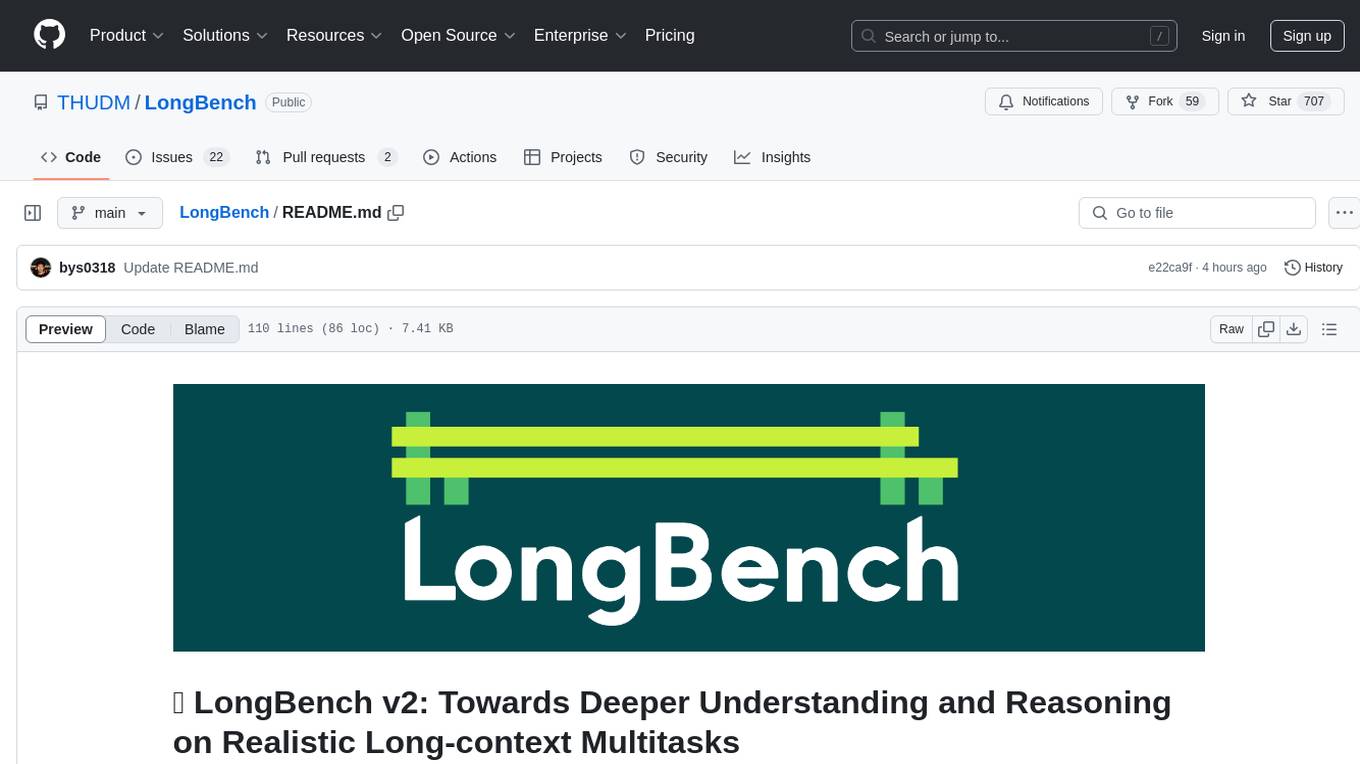
LongBench
LongBench v2 is a benchmark designed to assess the ability of large language models (LLMs) to handle long-context problems requiring deep understanding and reasoning across various real-world multitasks. It consists of 503 challenging multiple-choice questions with contexts ranging from 8k to 2M words, covering six major task categories. The dataset is collected from nearly 100 highly educated individuals with diverse professional backgrounds and is designed to be challenging even for human experts. The evaluation results highlight the importance of enhanced reasoning ability and scaling inference-time compute to tackle the long-context challenges in LongBench v2.
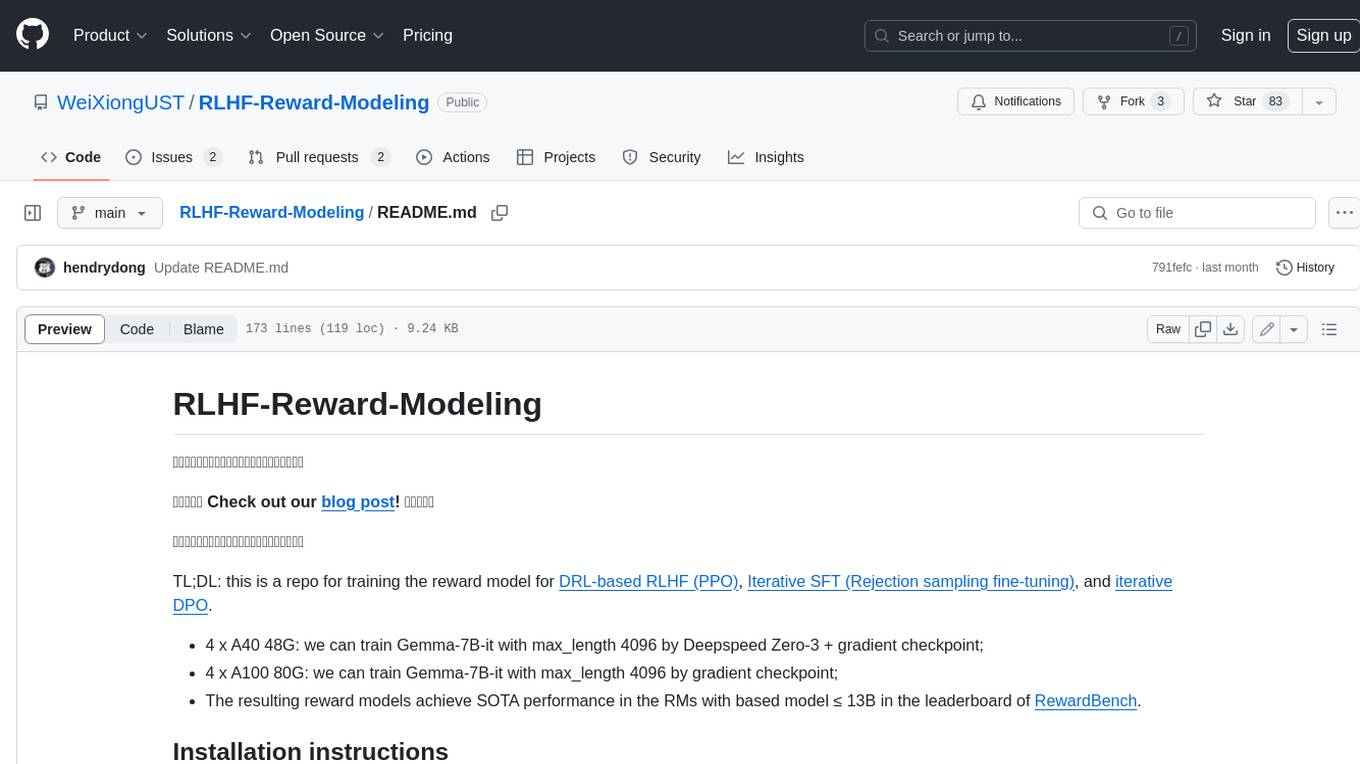
RLHF-Reward-Modeling
This repository contains code for training reward models for Deep Reinforcement Learning-based Reward-modulated Hierarchical Fine-tuning (DRL-based RLHF), Iterative Selection Fine-tuning (Rejection sampling fine-tuning), and iterative Decision Policy Optimization (DPO). The reward models are trained using a Bradley-Terry model based on the Gemma and Mistral language models. The resulting reward models achieve state-of-the-art performance on the RewardBench leaderboard for reward models with base models of up to 13B parameters.
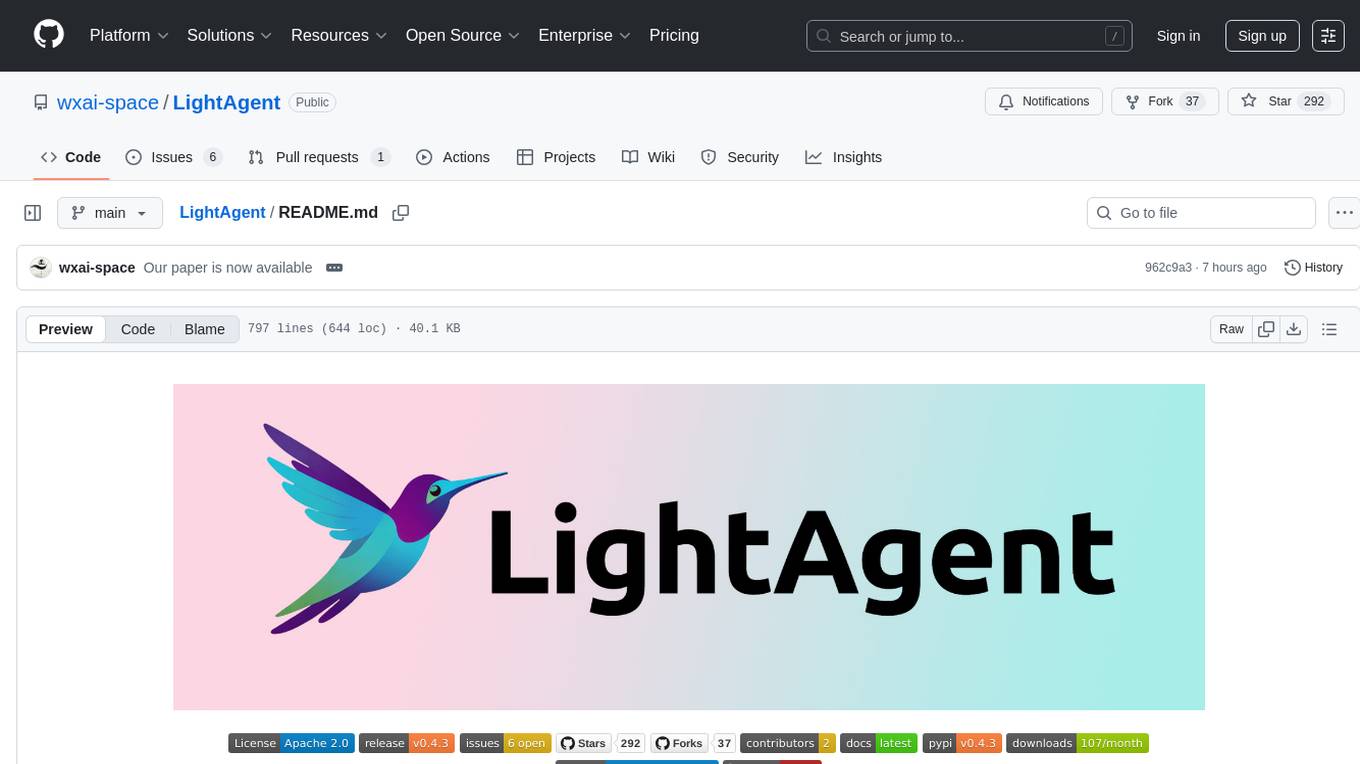
LightAgent
LightAgent is a lightweight, open-source Agentic AI development framework with memory, tools, and a tree of thought. It supports multi-agent collaboration, autonomous learning, tool integration, complex task handling, and multi-model support. It also features a streaming API, tool generator, agent self-learning, adaptive tool mechanism, and more. LightAgent is designed for intelligent customer service, data analysis, automated tools, and educational assistance.
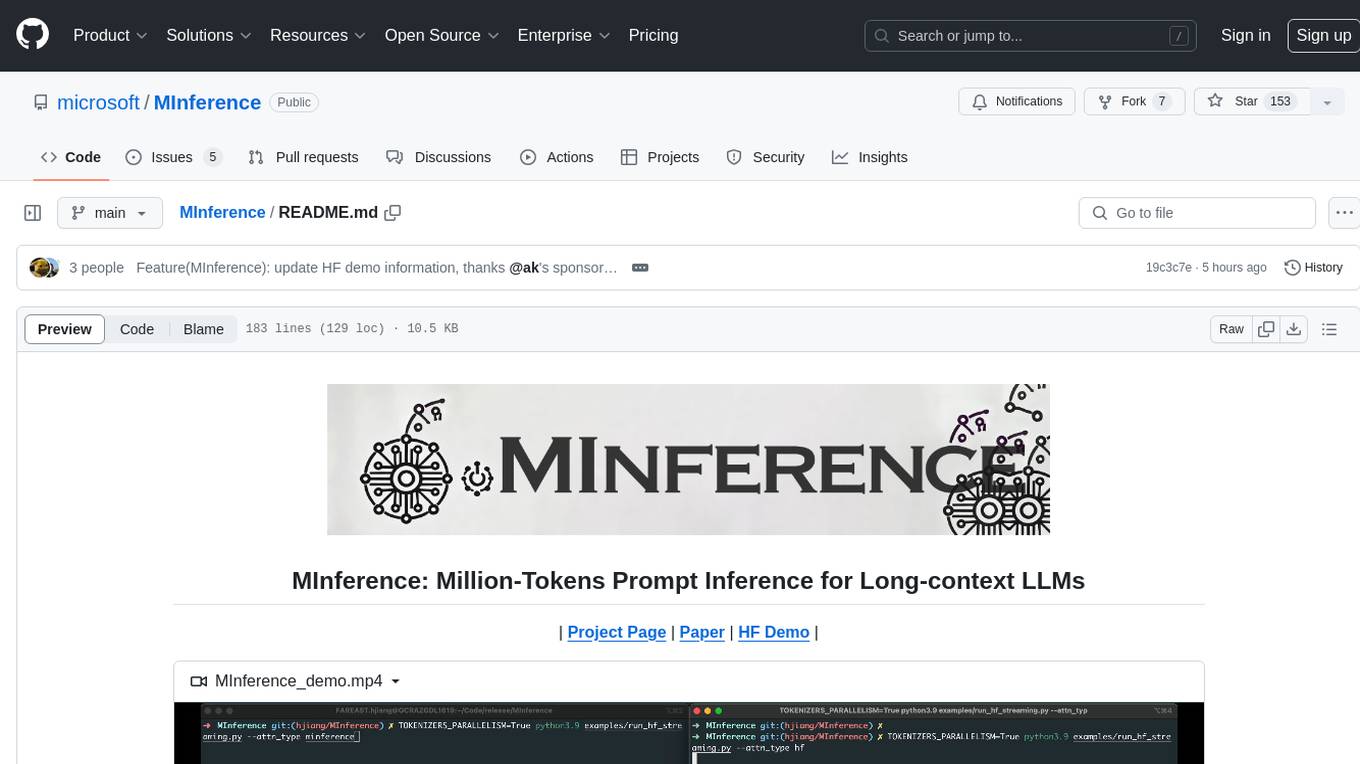
MInference
MInference is a tool designed to accelerate pre-filling for long-context Language Models (LLMs) by leveraging dynamic sparse attention. It achieves up to a 10x speedup for pre-filling on an A100 while maintaining accuracy. The tool supports various decoding LLMs, including LLaMA-style models and Phi models, and provides custom kernels for attention computation. MInference is useful for researchers and developers working with large-scale language models who aim to improve efficiency without compromising accuracy.
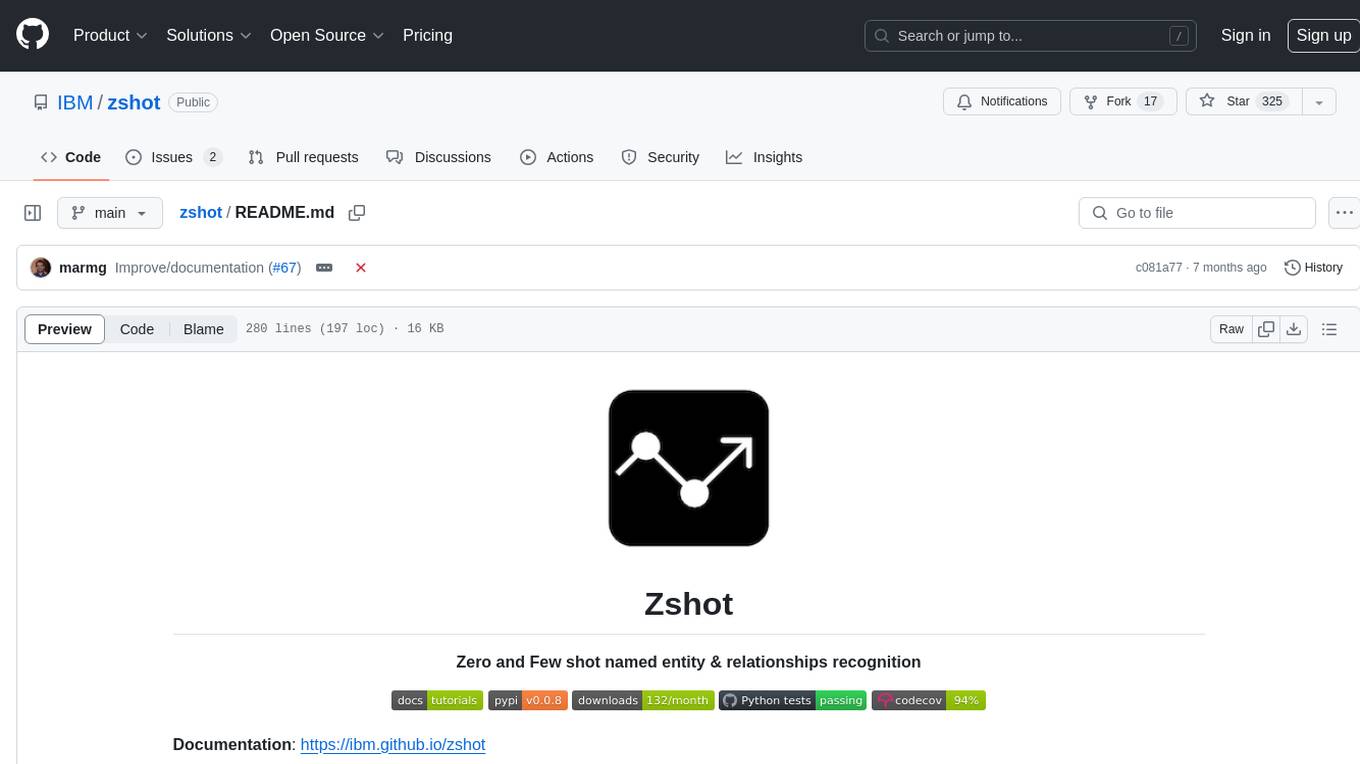
zshot
Zshot is a highly customizable framework for performing Zero and Few shot named entity and relationships recognition. It can be used for mentions extraction, wikification, zero and few shot named entity recognition, zero and few shot named relationship recognition, and visualization of zero-shot NER and RE extraction. The framework consists of two main components: the mentions extractor and the linker. There are multiple mentions extractors and linkers available, each serving a specific purpose. Zshot also includes a relations extractor and a knowledge extractor for extracting relations among entities and performing entity classification. The tool requires Python 3.6+ and dependencies like spacy, torch, transformers, evaluate, and datasets for evaluation over datasets like OntoNotes. Optional dependencies include flair and blink for additional functionalities. Zshot provides examples, tutorials, and evaluation methods to assess the performance of the components.
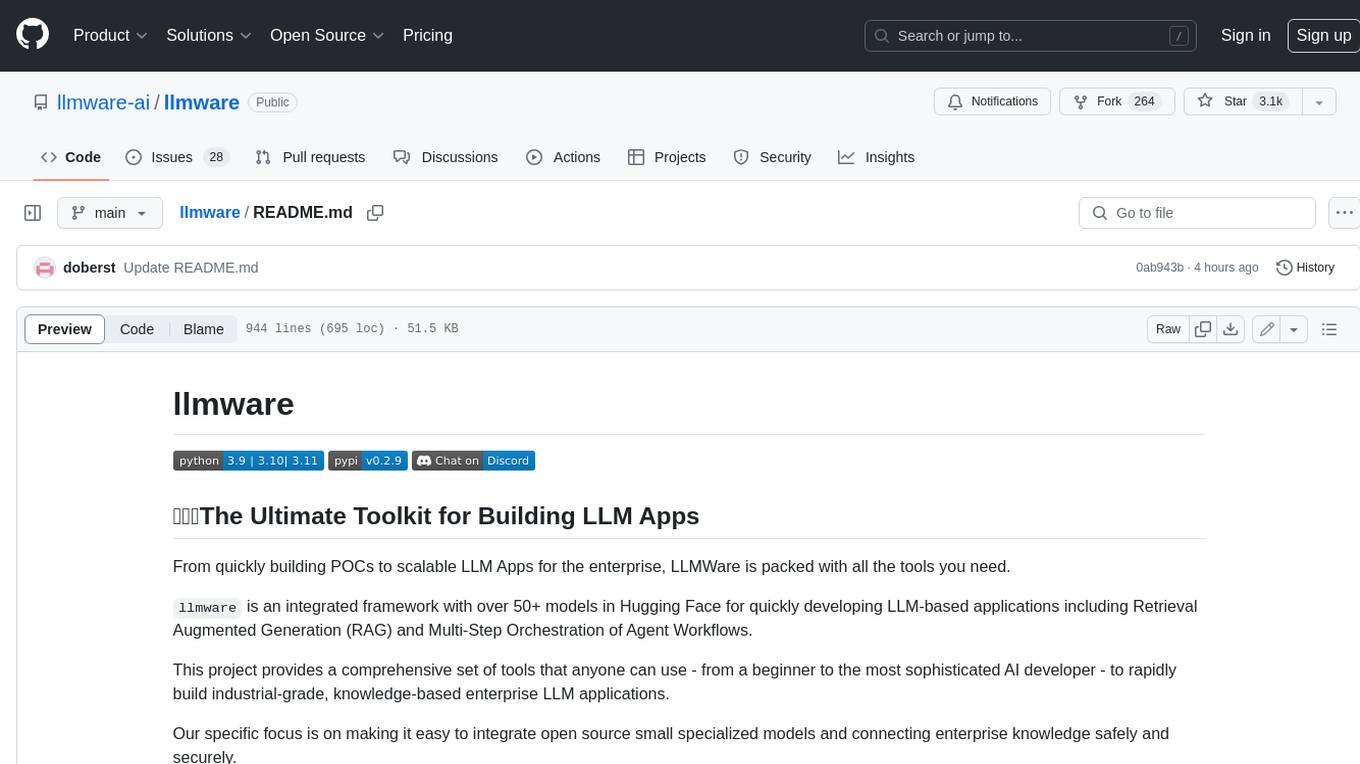
llmware
LLMWare is a framework for quickly developing LLM-based applications including Retrieval Augmented Generation (RAG) and Multi-Step Orchestration of Agent Workflows. This project provides a comprehensive set of tools that anyone can use - from a beginner to the most sophisticated AI developer - to rapidly build industrial-grade, knowledge-based enterprise LLM applications. Our specific focus is on making it easy to integrate open source small specialized models and connecting enterprise knowledge safely and securely.
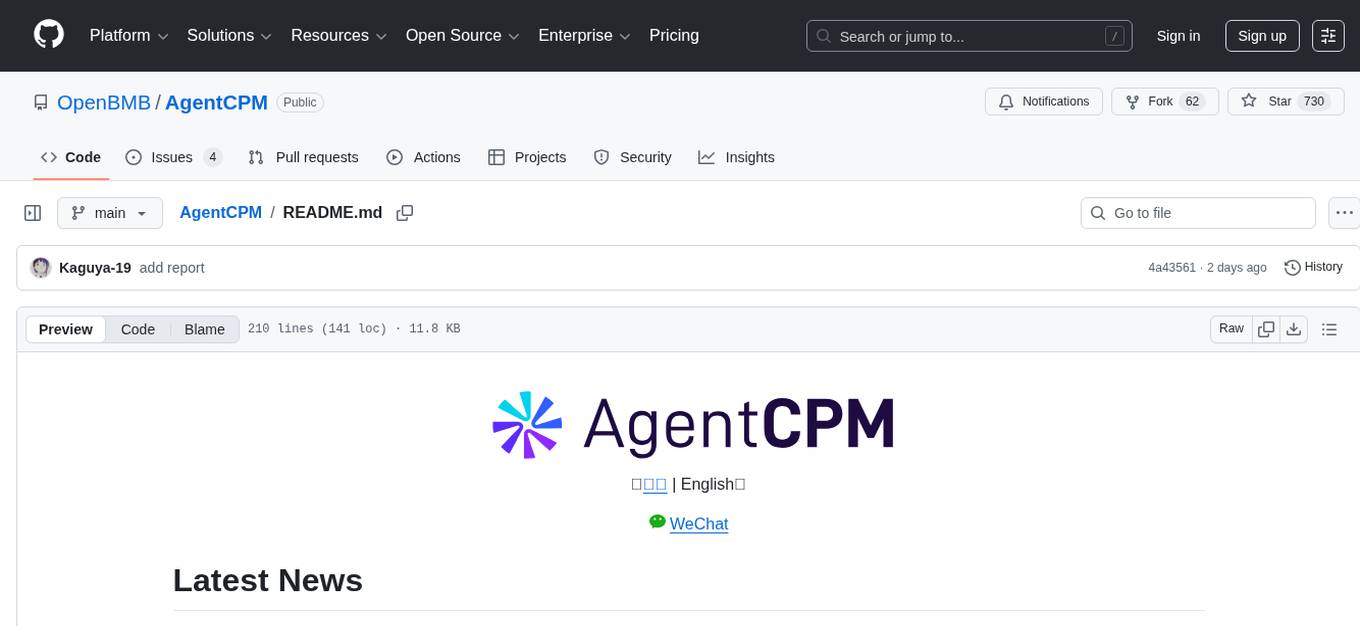
AgentCPM
AgentCPM is a series of open-source LLM agents jointly developed by THUNLP, Renmin University of China, ModelBest, and the OpenBMB community. It addresses challenges faced by agents in real-world applications such as limited long-horizon capability, autonomy, and generalization. The team focuses on building deep research capabilities for agents, releasing AgentCPM-Explore, a deep-search LLM agent, and AgentCPM-Report, a deep-research LLM agent. AgentCPM-Explore is the first open-source agent model with 4B parameters to appear on widely used long-horizon agent benchmarks. AgentCPM-Report is built on the 8B-parameter base model MiniCPM4.1, autonomously generating long-form reports with extreme performance and minimal footprint, designed for high-privacy scenarios with offline and agile local deployment.

DemoGPT
DemoGPT is an all-in-one agent library that provides tools, prompts, frameworks, and LLM models for streamlined agent development. It leverages GPT-3.5-turbo to generate LangChain code, creating interactive Streamlit applications. The tool is designed for creating intelligent, interactive, and inclusive solutions in LLM-based application development. It offers model flexibility, iterative development, and a commitment to user engagement. Future enhancements include integrating Gorilla for autonomous API usage and adding a publicly available database for refining the generation process.
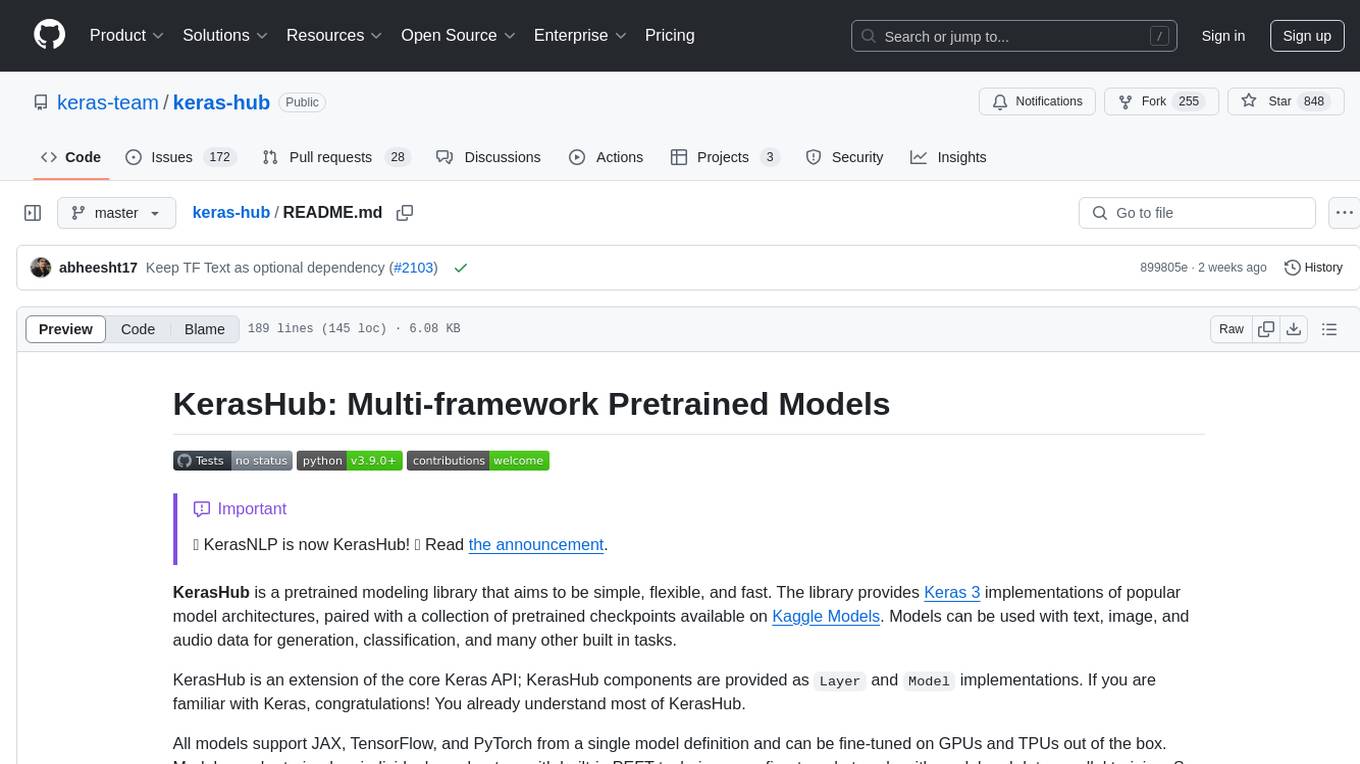
keras-hub
KerasHub is a pretrained modeling library that provides Keras 3 implementations of popular model architectures with pretrained checkpoints. It supports text, image, and audio data for generation, classification, and other tasks. Models are compatible with JAX, TensorFlow, and PyTorch, and can be fine-tuned on GPUs and TPUs. KerasHub components are provided as Layer and Model implementations, extending the core Keras API.
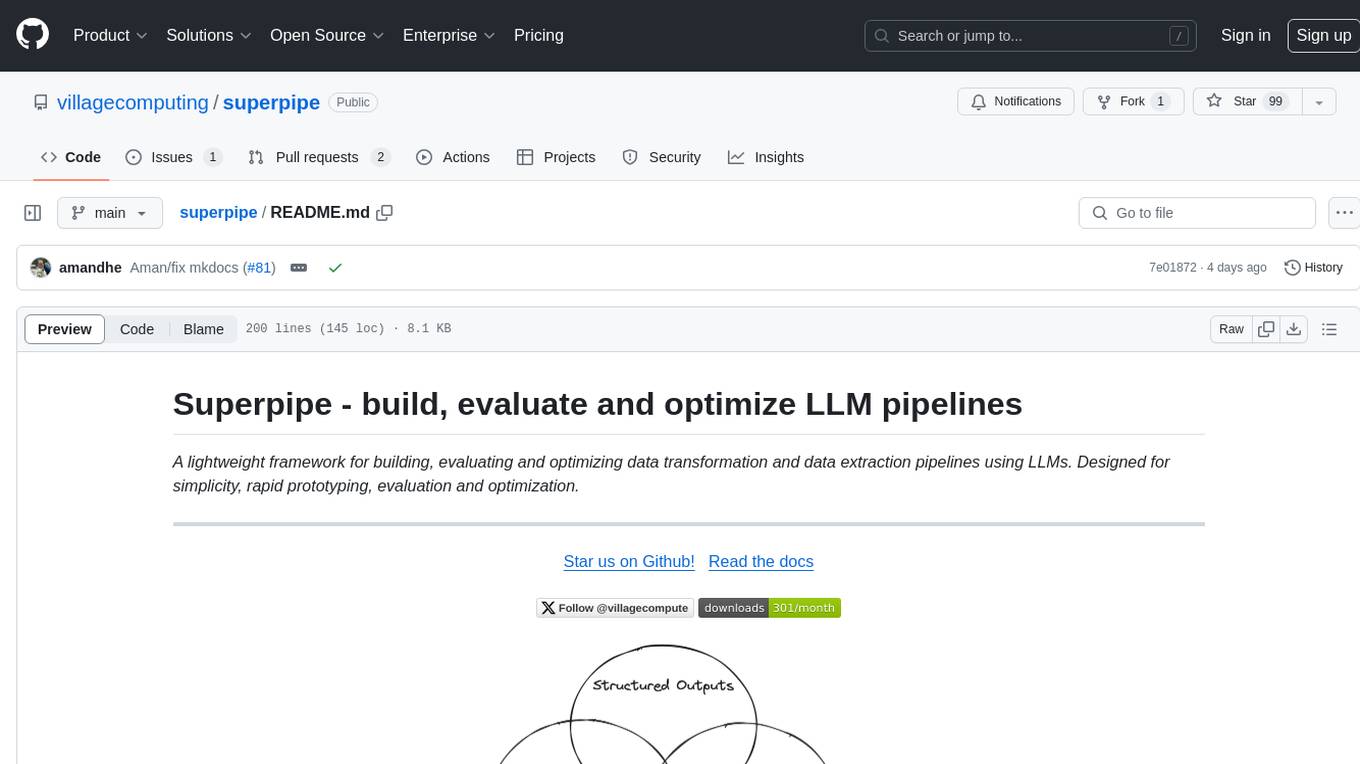
superpipe
Superpipe is a lightweight framework designed for building, evaluating, and optimizing data transformation and data extraction pipelines using LLMs. It allows users to easily combine their favorite LLM libraries with Superpipe's building blocks to create pipelines tailored to their unique data and use cases. The tool facilitates rapid prototyping, evaluation, and optimization of end-to-end pipelines for tasks such as classification and evaluation of job departments based on work history. Superpipe also provides functionalities for evaluating pipeline performance, optimizing parameters for cost, accuracy, and speed, and conducting grid searches to experiment with different models and prompts.

Trace
Trace is a new AutoDiff-like tool for training AI systems end-to-end with general feedback. It generalizes the back-propagation algorithm by capturing and propagating an AI system's execution trace. Implemented as a PyTorch-like Python library, users can write Python code directly and use Trace primitives to optimize certain parts, similar to training neural networks.
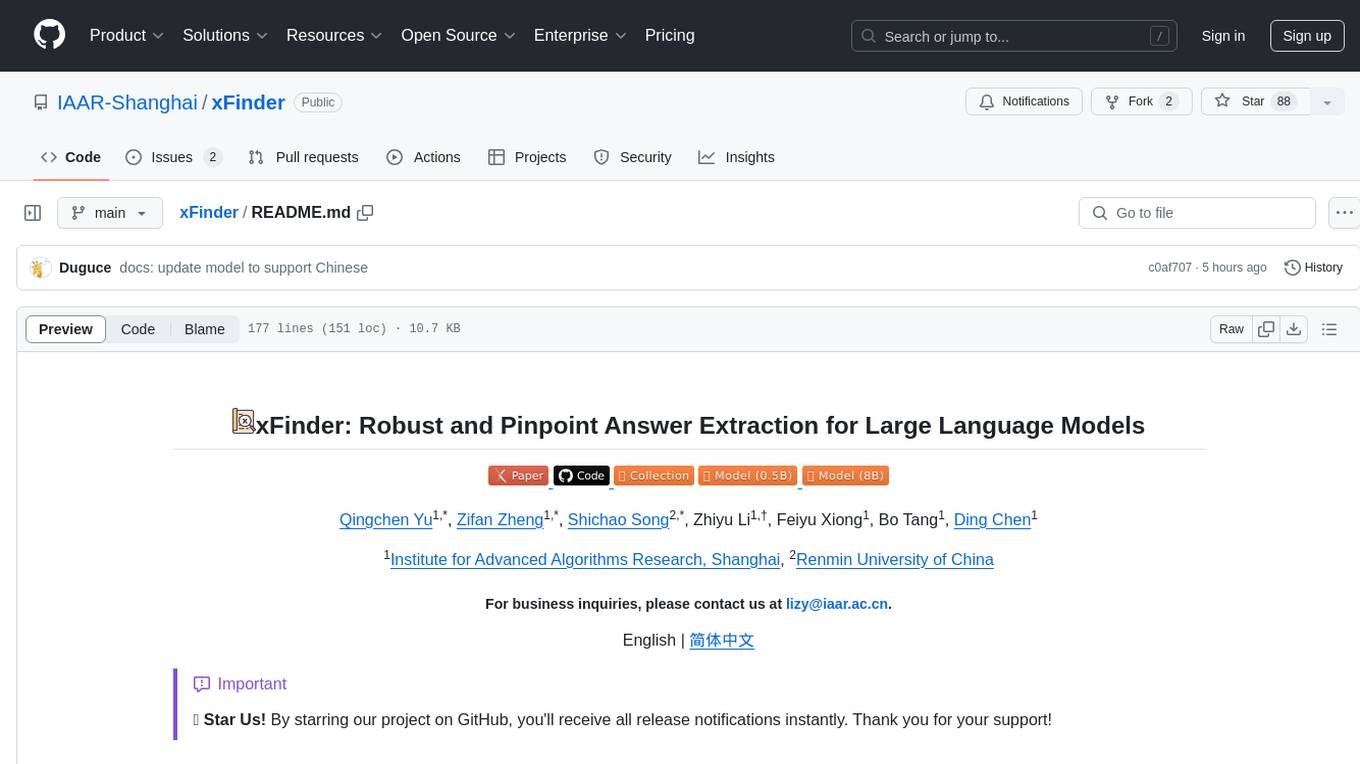
xFinder
xFinder is a model specifically designed for key answer extraction from large language models (LLMs). It addresses the challenges of unreliable evaluation methods by optimizing the key answer extraction module. The model achieves high accuracy and robustness compared to existing frameworks, enhancing the reliability of LLM evaluation. It includes a specialized dataset, the Key Answer Finder (KAF) dataset, for effective training and evaluation. xFinder is suitable for researchers and developers working with LLMs to improve answer extraction accuracy.
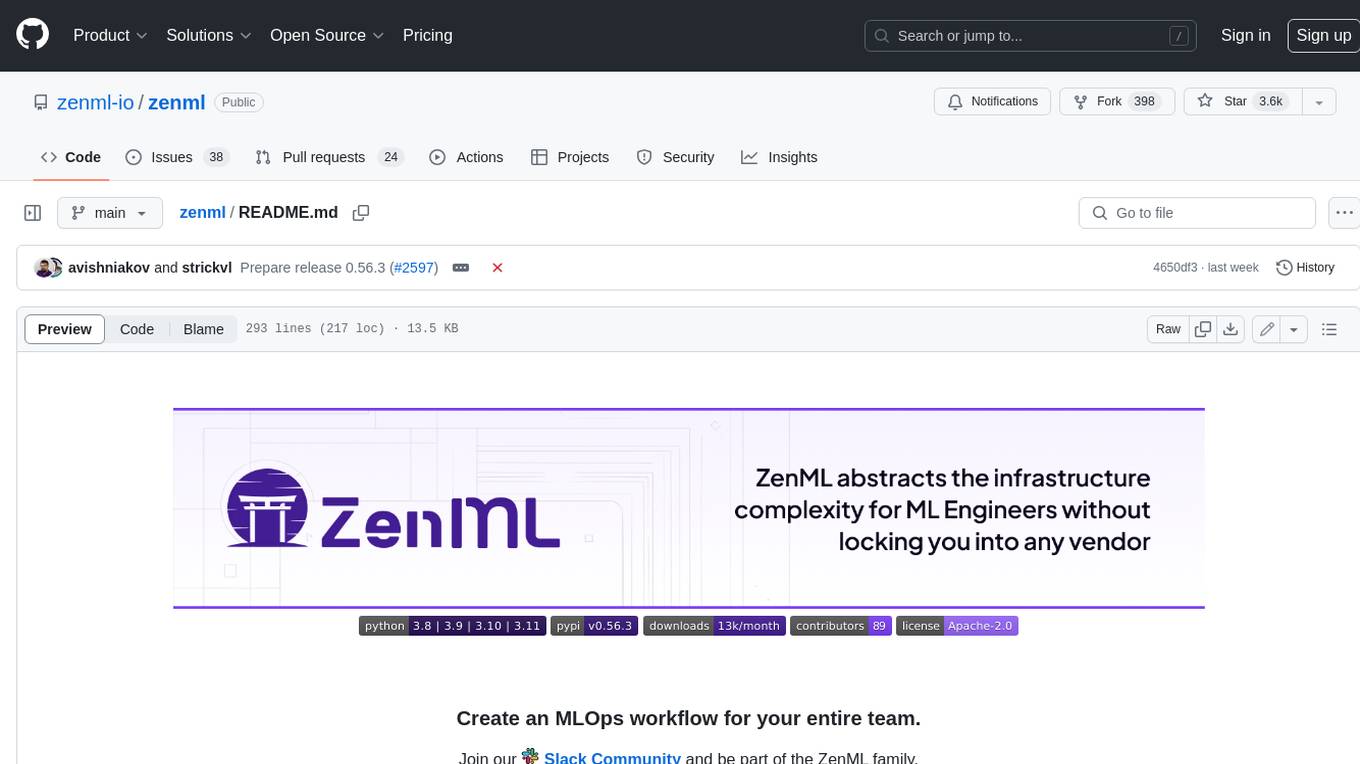
zenml
ZenML is an extensible, open-source MLOps framework for creating portable, production-ready machine learning pipelines. By decoupling infrastructure from code, ZenML enables developers across your organization to collaborate more effectively as they develop to production.
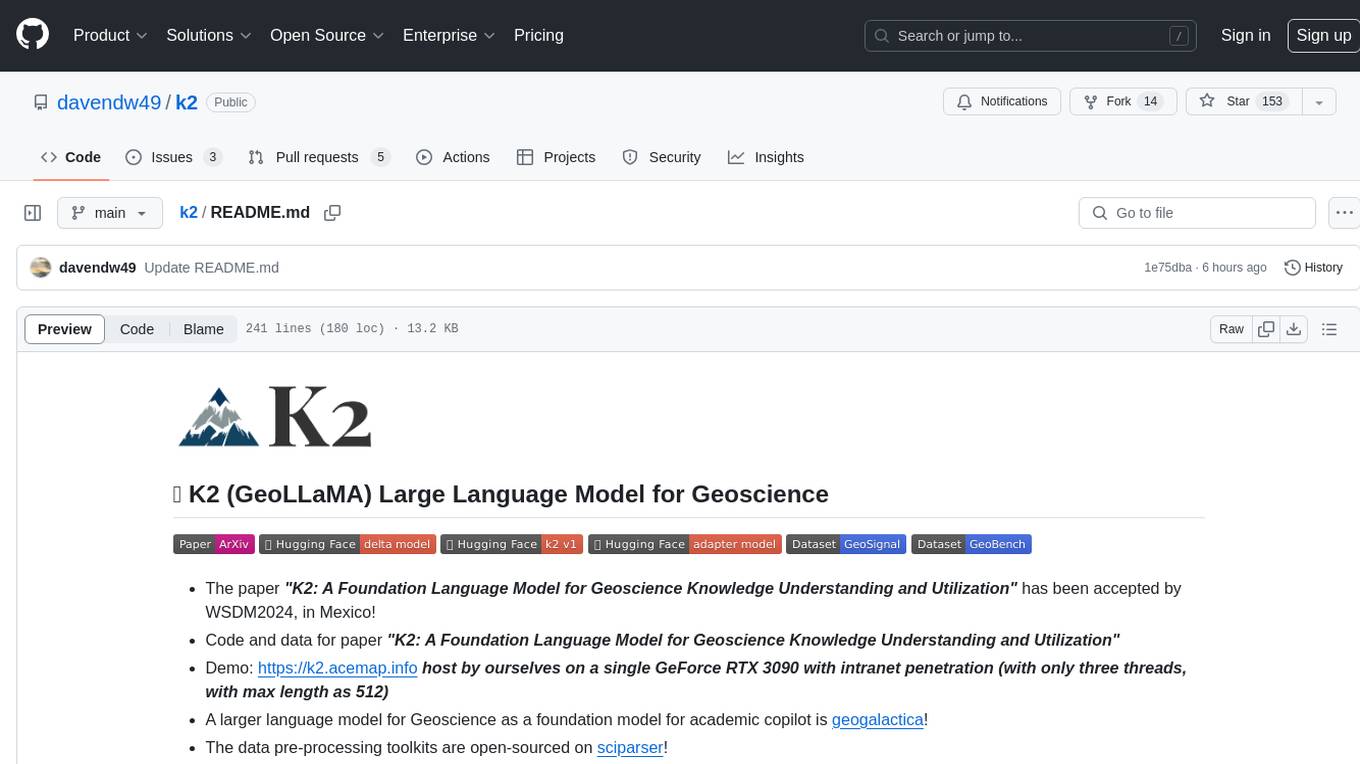
k2
K2 (GeoLLaMA) is a large language model for geoscience, trained on geoscience literature and fine-tuned with knowledge-intensive instruction data. It outperforms baseline models on objective and subjective tasks. The repository provides K2 weights, core data of GeoSignal, GeoBench benchmark, and code for further pretraining and instruction tuning. The model is available on Hugging Face for use. The project aims to create larger and more powerful geoscience language models in the future.
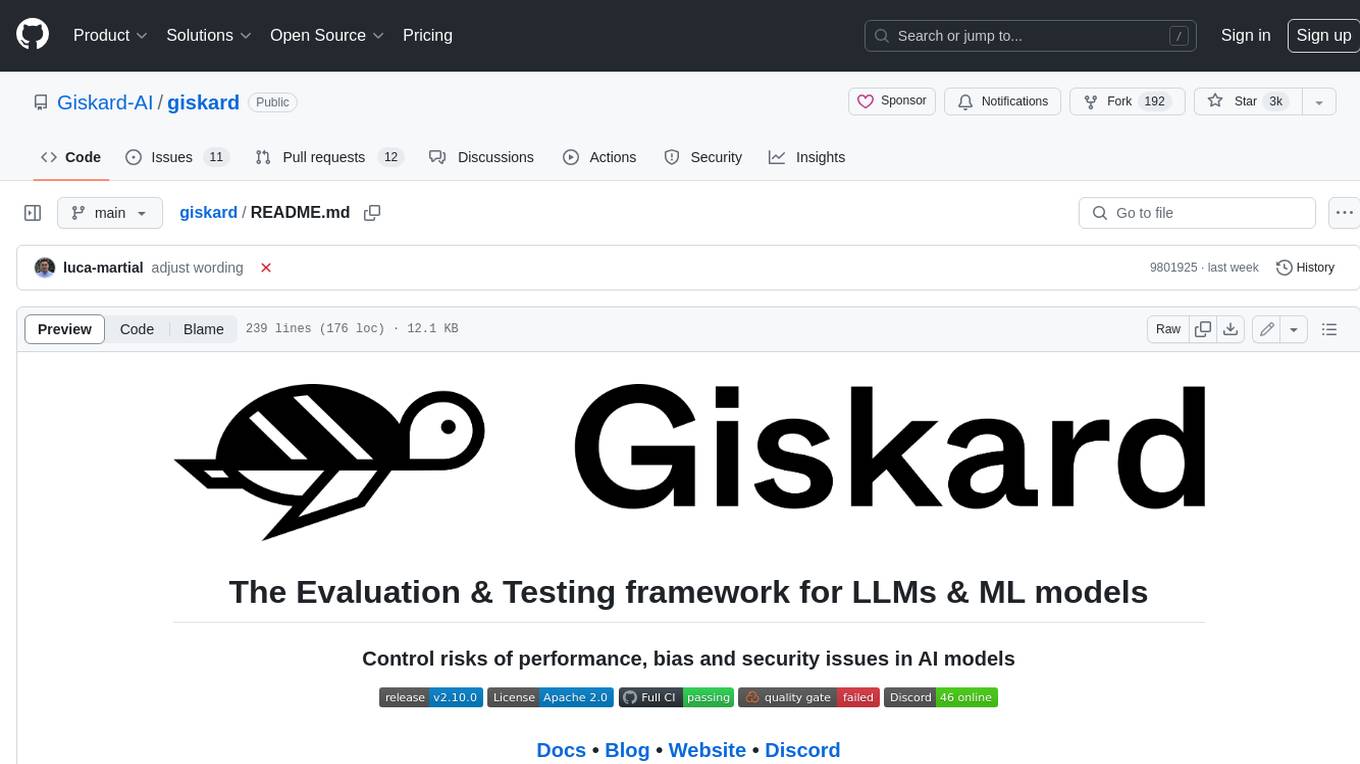
giskard
Giskard is an open-source Python library that automatically detects performance, bias & security issues in AI applications. The library covers LLM-based applications such as RAG agents, all the way to traditional ML models for tabular data.
For similar tasks

LLMLingua
LLMLingua is a tool that utilizes a compact, well-trained language model to identify and remove non-essential tokens in prompts. This approach enables efficient inference with large language models, achieving up to 20x compression with minimal performance loss. The tool includes LLMLingua, LongLLMLingua, and LLMLingua-2, each offering different levels of prompt compression and performance improvements for tasks involving large language models.
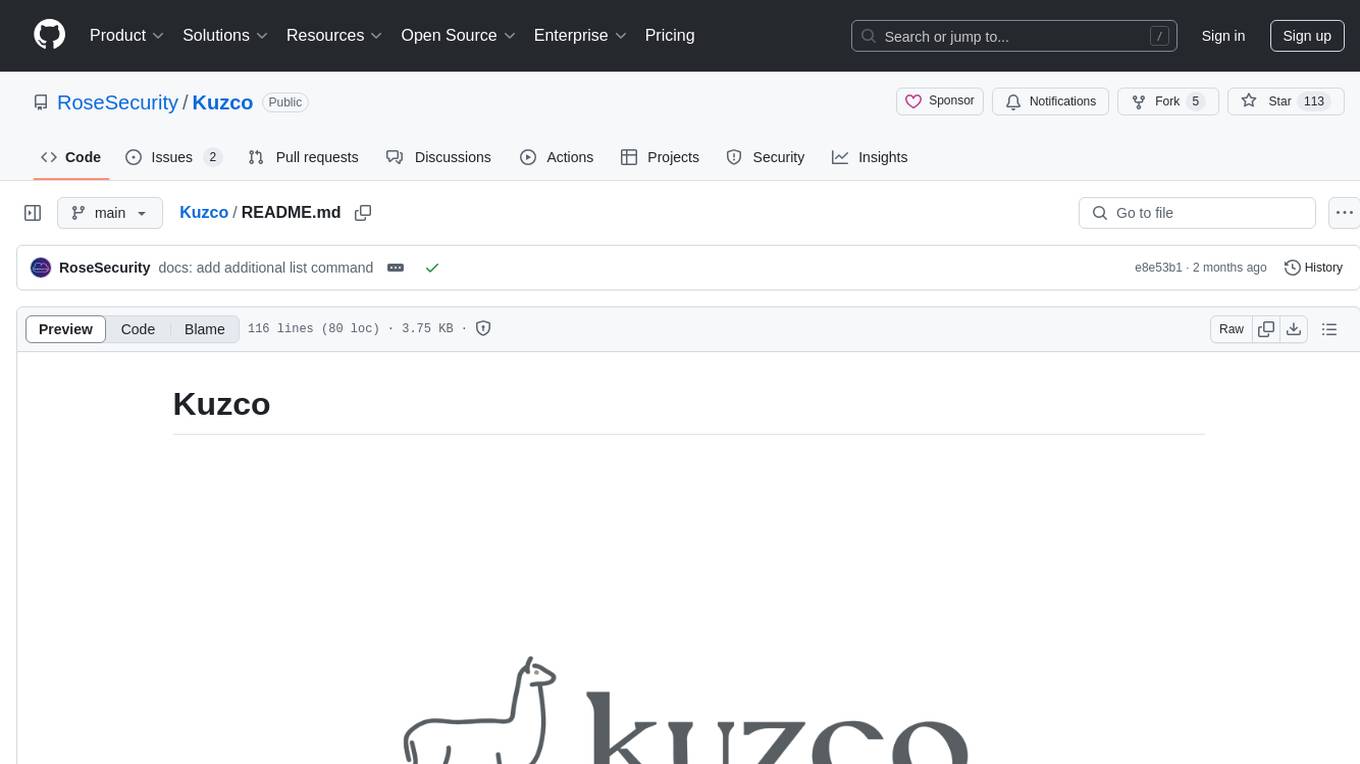
Kuzco
Enhance your Terraform and OpenTofu configurations with intelligent analysis powered by local LLMs. Kuzco reviews your resources, compares them to the provider schema, detects unused parameters, and suggests improvements for a more secure, reliable, and optimized setup. It saves time by avoiding the need to dig through the Terraform registry and decipher unclear options.
For similar jobs
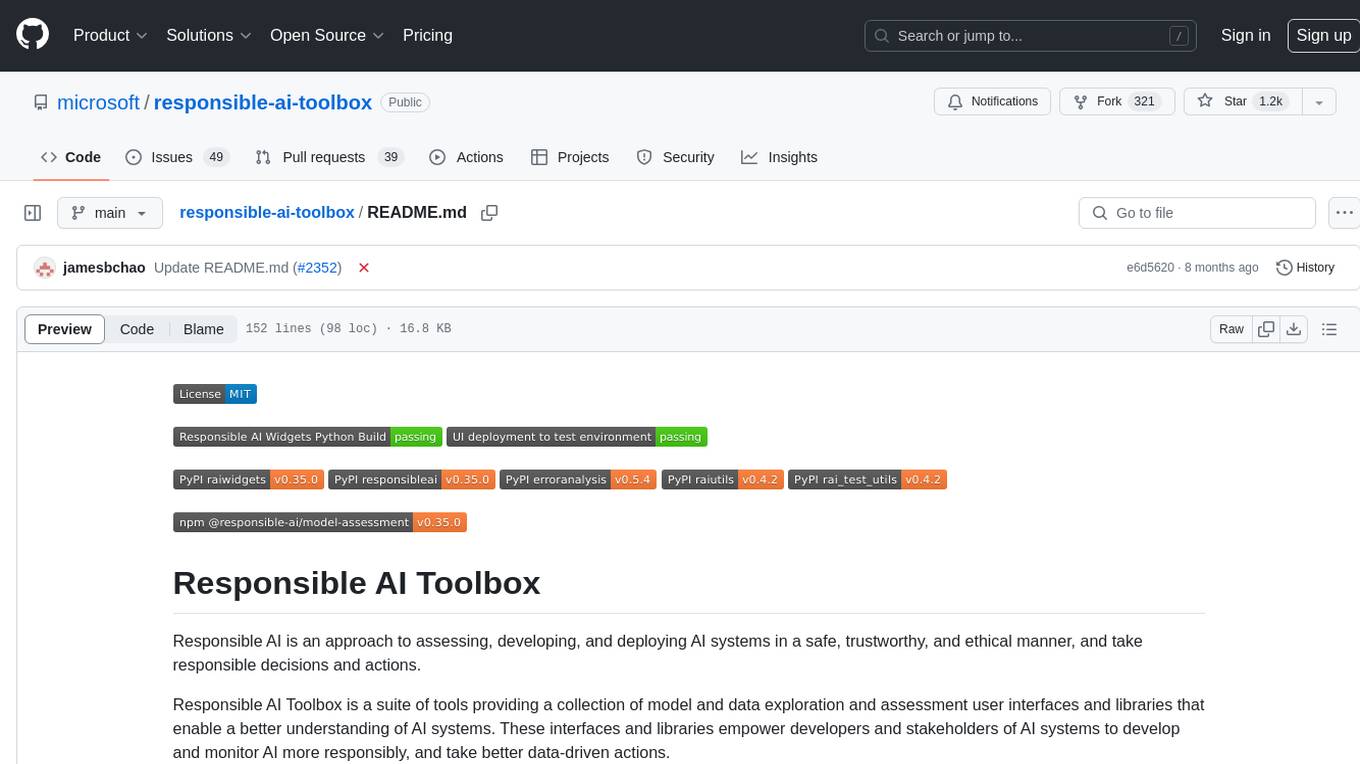
responsible-ai-toolbox
Responsible AI Toolbox is a suite of tools providing model and data exploration and assessment interfaces and libraries for understanding AI systems. It empowers developers and stakeholders to develop and monitor AI responsibly, enabling better data-driven actions. The toolbox includes visualization widgets for model assessment, error analysis, interpretability, fairness assessment, and mitigations library. It also offers a JupyterLab extension for managing machine learning experiments and a library for measuring gender bias in NLP datasets.

LLMLingua
LLMLingua is a tool that utilizes a compact, well-trained language model to identify and remove non-essential tokens in prompts. This approach enables efficient inference with large language models, achieving up to 20x compression with minimal performance loss. The tool includes LLMLingua, LongLLMLingua, and LLMLingua-2, each offering different levels of prompt compression and performance improvements for tasks involving large language models.
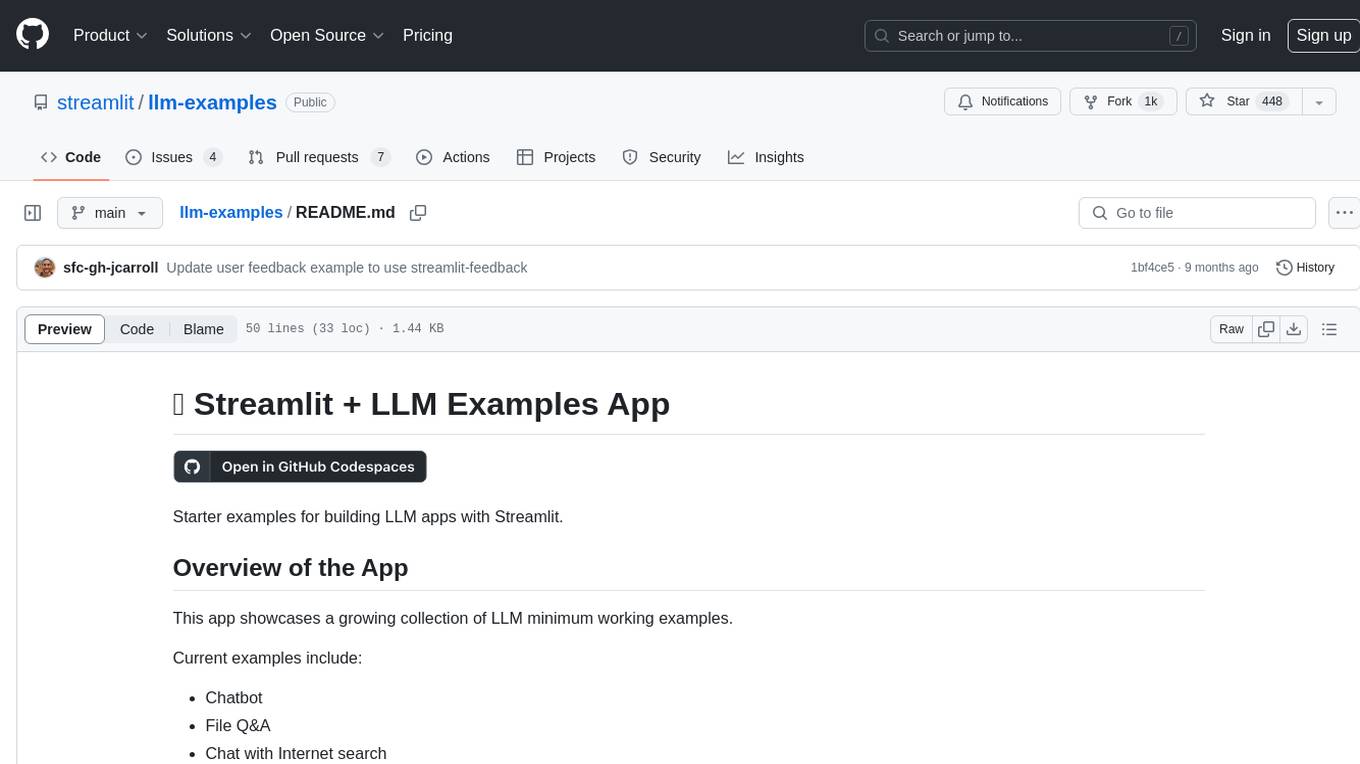
llm-examples
Starter examples for building LLM apps with Streamlit. This repository showcases a growing collection of LLM minimum working examples, including a Chatbot, File Q&A, Chat with Internet search, LangChain Quickstart, LangChain PromptTemplate, and Chat with user feedback. Users can easily get their own OpenAI API key and set it as an environment variable in Streamlit apps to run the examples locally.

LMOps
LMOps is a research initiative focusing on fundamental research and technology for building AI products with foundation models, particularly enabling AI capabilities with Large Language Models (LLMs) and Generative AI models. The project explores various aspects such as prompt optimization, longer context handling, LLM alignment, acceleration of LLMs, LLM customization, and understanding in-context learning. It also includes tools like Promptist for automatic prompt optimization, Structured Prompting for efficient long-sequence prompts consumption, and X-Prompt for extensible prompts beyond natural language. Additionally, LLMA accelerators are developed to speed up LLM inference by referencing and copying text spans from documents. The project aims to advance technologies that facilitate prompting language models and enhance the performance of LLMs in various scenarios.
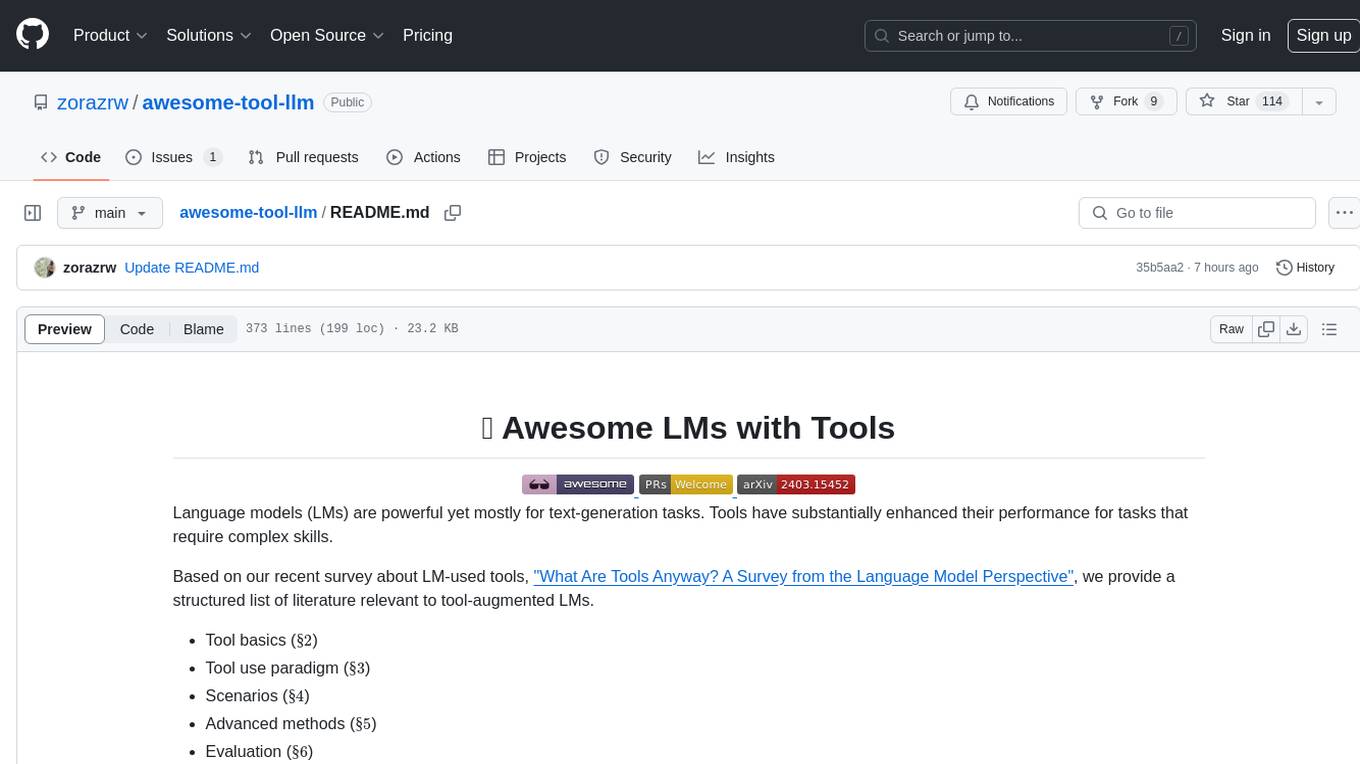
awesome-tool-llm
This repository focuses on exploring tools that enhance the performance of language models for various tasks. It provides a structured list of literature relevant to tool-augmented language models, covering topics such as tool basics, tool use paradigm, scenarios, advanced methods, and evaluation. The repository includes papers, preprints, and books that discuss the use of tools in conjunction with language models for tasks like reasoning, question answering, mathematical calculations, accessing knowledge, interacting with the world, and handling non-textual modalities.
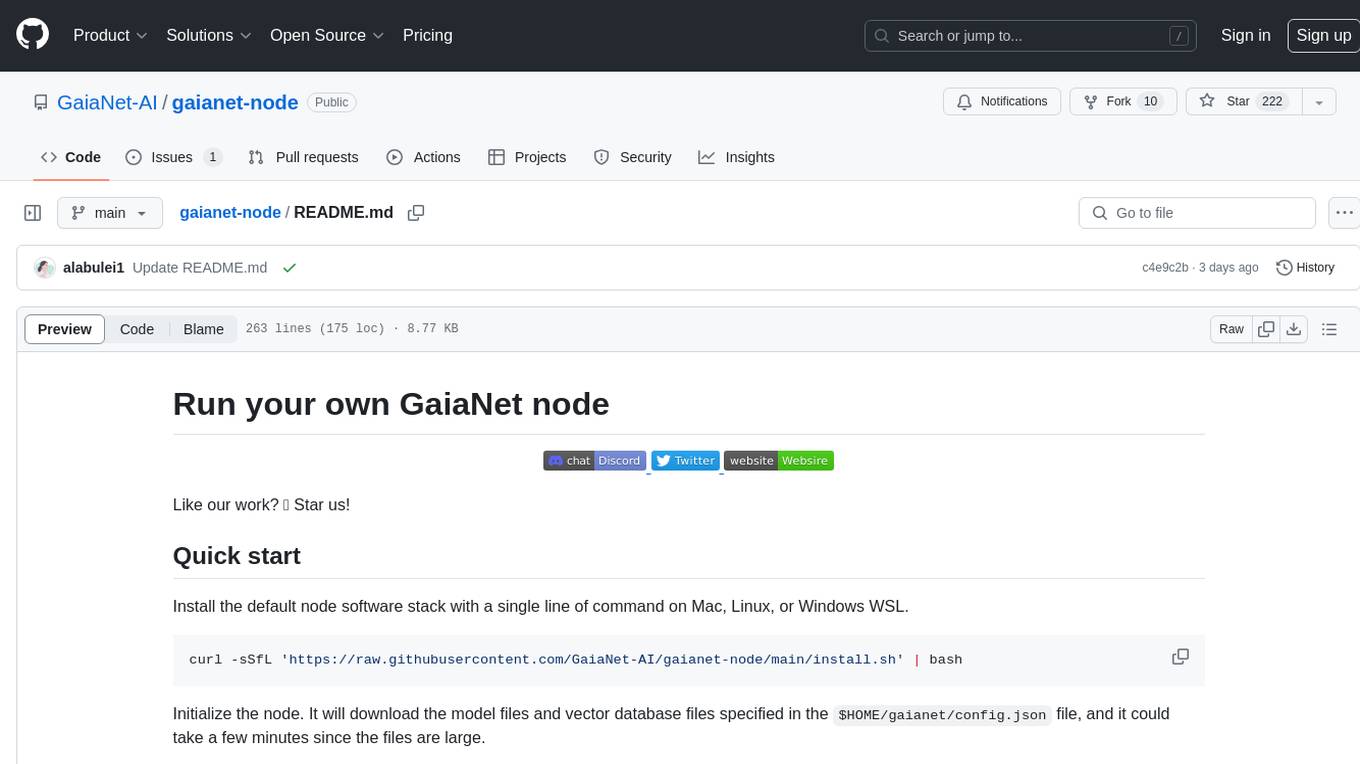
gaianet-node
GaiaNet-node is a tool that allows users to run their own GaiaNet node, enabling them to interact with an AI agent. The tool provides functionalities to install the default node software stack, initialize the node with model files and vector database files, start the node, stop the node, and update configurations. Users can use pre-set configurations or pass a custom URL for initialization. The tool is designed to facilitate communication with the AI agent and access node information via a browser. GaiaNet-node requires sudo privilege for installation but can also be installed without sudo privileges with specific commands.
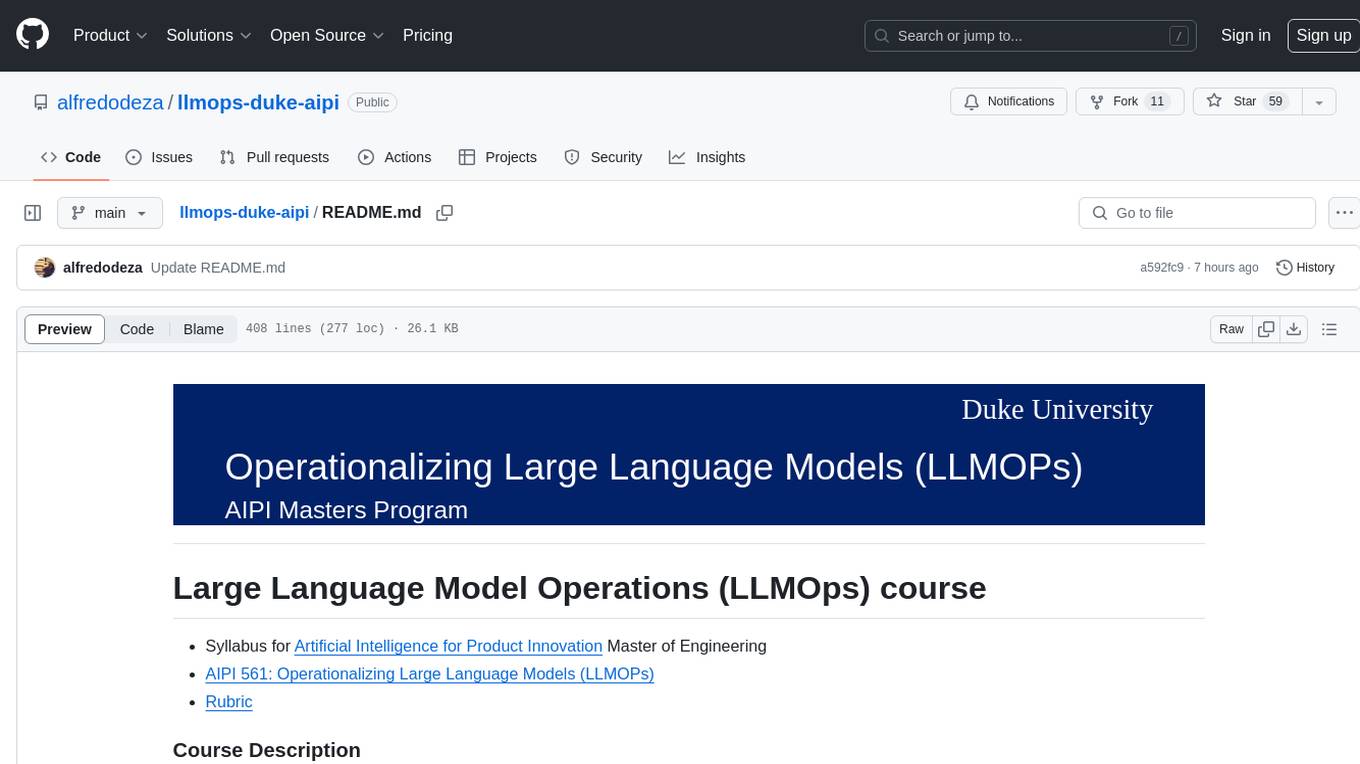
llmops-duke-aipi
LLMOps Duke AIPI is a course focused on operationalizing Large Language Models, teaching methodologies for developing applications using software development best practices with large language models. The course covers various topics such as generative AI concepts, setting up development environments, interacting with large language models, using local large language models, applied solutions with LLMs, extensibility using plugins and functions, retrieval augmented generation, introduction to Python web frameworks for APIs, DevOps principles, deploying machine learning APIs, LLM platforms, and final presentations. Students will learn to build, share, and present portfolios using Github, YouTube, and Linkedin, as well as develop non-linear life-long learning skills. Prerequisites include basic Linux and programming skills, with coursework available in Python or Rust. Additional resources and references are provided for further learning and exploration.
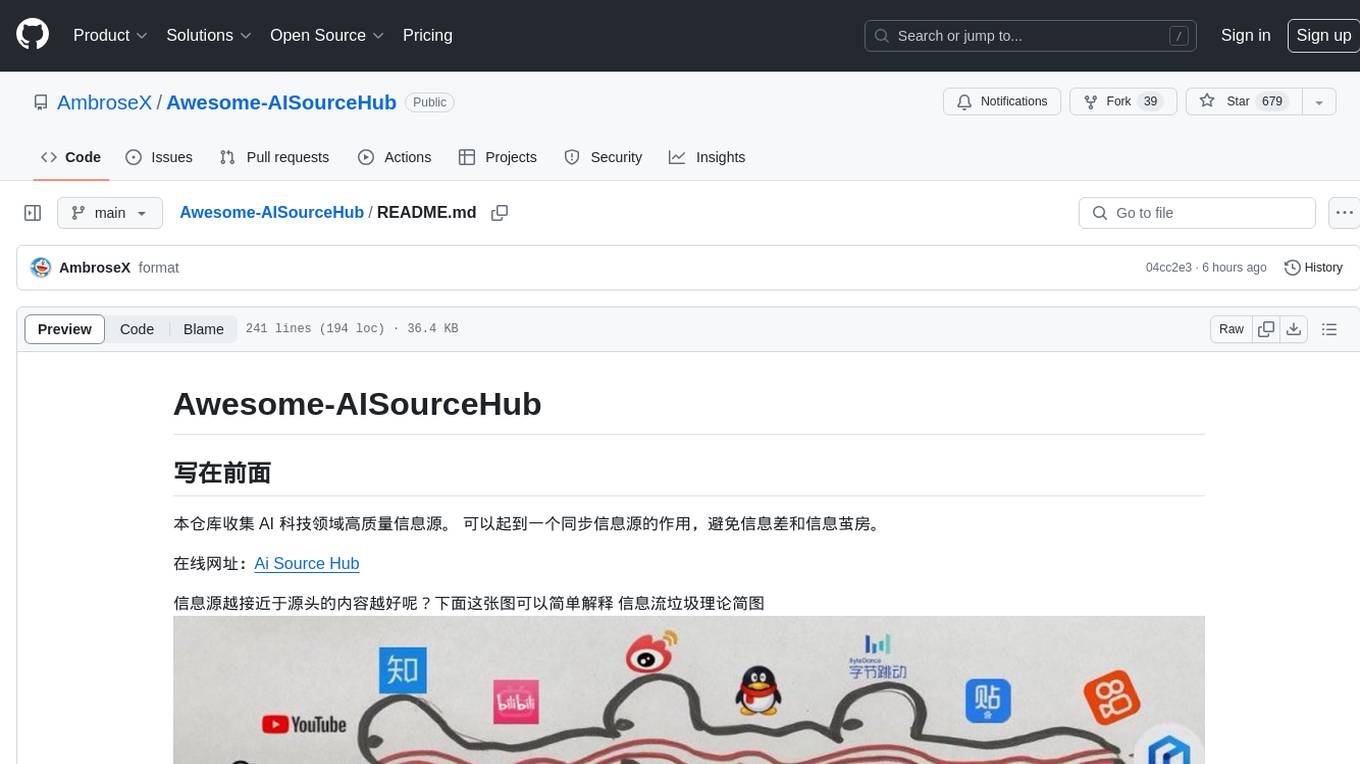
Awesome-AISourceHub
Awesome-AISourceHub is a repository that collects high-quality information sources in the field of AI technology. It serves as a synchronized source of information to avoid information gaps and information silos. The repository aims to provide valuable resources for individuals such as AI book authors, enterprise decision-makers, and tool developers who frequently use Twitter to share insights and updates related to AI advancements. The platform emphasizes the importance of accessing information closer to the source for better quality content. Users can contribute their own high-quality information sources to the repository by following specific steps outlined in the contribution guidelines. The repository covers various platforms such as Twitter, public accounts, knowledge planets, podcasts, blogs, websites, YouTube channels, and more, offering a comprehensive collection of AI-related resources for individuals interested in staying updated with the latest trends and developments in the AI field.





